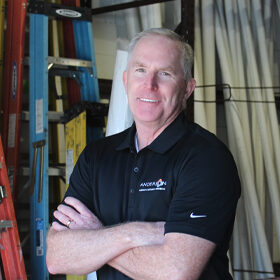How Heat Pumps Effectively & Efficiently Keep Homes Warm During the Winter
As seasoned residents know, winters in the Midwest can be unforgiving. Staying warm throughout the duration is no small feat, and the most crucial step is keeping the house nice and toasty. That means the home’s heating system bears much of the load, and the impact on the utility bill can be enormous, especially with many people spending more time at home this year. Heat pump systems are gaining more and more popularity over traditional counterparts like furnaces and boilers, and not just because they can potentially cut energy usage in half.
Heat Pump Basics

Heat pumps work by absorbing heat from one environment and transferring it to another. Even a cold outdoor environment contains enough heat energy for the system to work. Most heat pumps draw heat from the air, but some more advanced types use nearby groundwater or soil as their heat source. The basic process is essentially the same, no matter the source.
Heat energy is absorbed by a metal coil filled with liquid refrigerant, located in the outdoor unit. The refrigerant is evaporated and pumped into a compressor – the processes of evaporation and compression greatly increase the refrigerant’s heat all on their own. The refrigerant then travels to a condenser coil in the indoor “air handler” unit, where heat is released into the air and forced through the home’s ducts. The refrigerant, now cooled, returns to liquid form and travels back outside to do it all again.
What Makes Heat Pumps Energy-Efficient?
Unlike their counterparts, heat pumps do not produce heat but harness and transfer it between environments. While most use electricity to accomplish this, their energy consumption is much lower than most other heating systems. Some types, called absorption pumps, can even run on solar power.
Different types of heat pumps are designed for different climates and purposes. In areas like the Midwest that experience extremely low temperatures, a cold-climate or all-climate pump will work more efficiently than a standard air-source pump. Many new heat pumps go a step further in efficiency by automatically adjusting their output to use the minimum required energy for the thermostat’s demands.
More Benefits of Switching To a Heat Pump

A major factor in the rising popularity of heat pumps is that they are environmentally friendly. This is not simply because they reduce energy consumption, but also because they do not produce carbon monoxide. It also makes them safer, as they present no risk of fire or poisoning due to a gas leak for their entire lifespan.
Heat pumps can even be integrated with existing elements of a home’s heating system. If the home has no ductwork, a ductless mini-split heat pump may be installed, allowing multiple units to be put in the home to heat each separate space individually. Some types of heat pumps can even produce hot water for general use or in radiant heating systems.
About Anderson Heating, Cooling, Plumbing & Electric
Anderson Heating, Cooling, Plumbing & Electric has been handling Mentor, Ohio’s HVAC needs since 1982. Their highly-trained and certified technicians are friendly, attentive, and punctual, and leave every home better than they found it. Anderson is ready to help 24/7, 365 days a year, with flat-rate pricing, financing, membership options, and a 100% guarantee on every service. Call them now for expert heat pump services.


